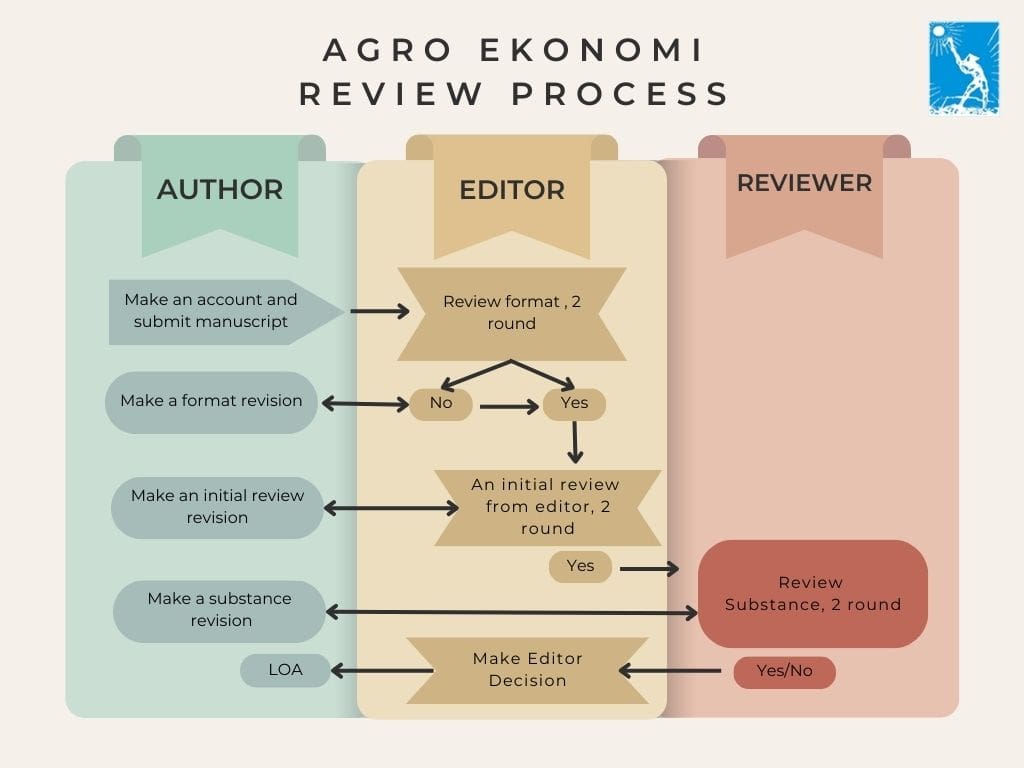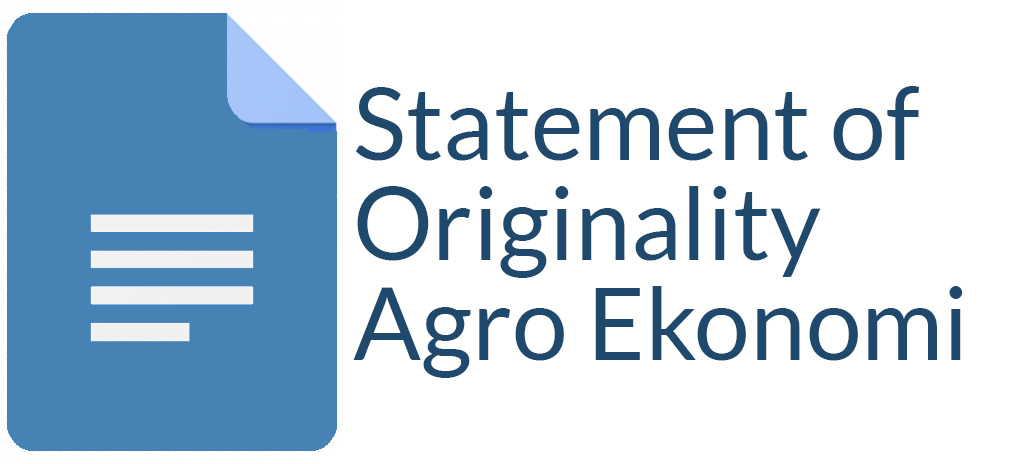Did The Program Kampung Iklim Lead Farmers to Implement more Adaptation Strategies? Case Study of Rice Farmers in Sleman Regency
Moh. Wahyudi Priyanto(1*), Jangkung Handoyo Mulyo(2), Irham Irham(3)
(1) Universitas Gadjah Mada
(2) Universitas Gadjah Mada
(3) Universitas Gadjah Mada
(*) Corresponding Author
Abstract
Keywords
Full Text:
PDFReferences
Abid, M., Schneider, U. A., & Scheffran, J. (2016). Adaptation to climate change and its impacts on food productivity and crop income: Perspectives of farmers in Rural Pakistan. Journal of Rural Studies, 47(2016), 254–266. https://doi.org/10.1016/j.jrurstud.2016.08.005
Afroz, R., & Akhtar, R. (2017). Determinants of Malaysian Farmers’ Choice of Adaptation Strategies for Adapting to Climate Change in Kedah Malaysia. Asian Journal of Agricultural Research, 11(4), 120–127. https://doi.org/10.3923/ajar.2017.120.127
Aggarwal, P. K., Jarvis, A., Campbell, B. M., Zougmoré, R. B., Khatri-Chhetri, A., Vermeulen, S. J., Loboguerrero, A. M., Sebastian, L. S., Kinyangi, J., Bonilla-Findji, O., Radeny, M., Recha, J., Martinez-Baron, D., Ramirez-Villegas, J., Huyer, S., Thornton, P., Wollenberg, E., Hansen, J., Alvarez-Toro, P., … Yen, B. T. (2018). The climate-smart village approach: Framework of an integrative strategy for scaling up adaptation options in agriculture. Ecology and Society, 23(1), 1–14. https://doi.org/10.5751/ES-09844-230114
Aldrian, E., Karmini, M., & Budiman. (2011). Adaptasi dan Mitigasi Perubahan Iklim di Indonesia. Pusat Perubahan Iklim dan Kualitas Udara, Badan Meteorologi, Klimatologi, dan Geofisika (BMKG).
Ali, A., & Erenstein, O. (2017). Assessing farmer use of climate change adaptation practices and impacts on food security and poverty in Pakistan. Climate Risk Management, 16(2017), 183–194. https://doi.org/10.1016/j.crm.2016.12.001
Azadi, Y., Yazdanpanah, M., & Mahmoudi, H. (2019). Understanding smallholder farmers’ adaptation behaviors through climate change beliefs, risk perception, trust, and psychological distance: Evidence from wheat growers in Iran. Journal of Environmental Management, 250(2019), 1–9. https://doi.org/10.1016/j.jenvman.2019.109456
Bacha, M. S., Nafees, M., & Adnan, S. (2018). Farmers perceptions about climate change vulnerabilities and their adaptation measures in District Swat. Sarhad Journal of Agriculture, 34(1), 1–16. https://doi.org/10.17582/journal.sja/2018/34.2.311.326
BPS Sleman. (2019). Kabupaten Sleman Dalam Angka 2019. BPS Kabupaten Sleman.
Fadina, A., & Barjolle, D. (2018). Farmers’ adaptation strategies to climate change and their implications in the Zou Department of South Benin. Environments, 5(15), 1–17. https://doi.org/10.3390/environments5010015
Fagariba, C., Song, S., & Soule Baoro, S. (2018). Climate change adaptation strategies and constraints in Northern Ghana: Evidence of farmers in Sissala West District. Sustainability, 10(1484), 1–18. https://doi.org/10.3390/su10051484
Gc, A., & Yeo, J.-H. (2019). Perception to adaptation of climate change in Nepal: An empirical analysis using multivariate probit model. Sci, 1(12), 1–14. https://doi.org/10.3390/sci1010012.v1
Greene, W. H. (2012). Econometric Analysis: Seventh Edition (7th ed). Prentice Hall.
Gunawati, D., & Rejekiningsih, T. (2020). Building Ecological Citizens Through the Implementation of Climate Village Programs as Climate Change Mitigation Effort. Proceedings of the 3rd International Conference on Learning Innovation and Quality Education (ICLIQE 2019), 397, 1124–1131. https://doi.org/10.2991/assehr.k.200129.139
Hasan, M. K., & Kumar, L. (2019). Comparison between meteorological data and farmer perceptions of climate change and vulnerability in relation to adaptation. Journal of Environmental Management, 237, 54–62. https://doi.org/10.1016/j.jenvman.2019.02.028
IPCC. (2014). Climate Change 2014: Synthesis Report. Intergovernmental Panel on Climate Change.
Irham, Saito, O., Mohri, H., Wirakusuma, G., Rohmah, F., & Perwitasari, H. (2018). Traditional Farmers’ Adaptation Strategies on Climate Change of Different Environmental Conditions in Yogyakarta Province, Indonesia. In K. Takeuchi, O. Saito, H. Matsuda, & G. Mohan (Eds.), Resilient Asia (pp. 81–94). Springer Japan. https://doi.org/10.1007/978-4-431-56597-0_5
Khanal, S., Mandal, R. A., & Nepal, A. (2019). Assessing Effectiveness of Climate Smart Activities: A Study from Rural Areas, Nepal. Agricultural Research & Technology: Open Access Journal, 20(1). https://doi.org/10.19080/ARTOAJ.2018.19.556114
Mase, A. S., Gramig, B. M., & Prokopy, L. S. (2017). Climate change beliefs, risk perceptions, and adaptation behavior among Midwestern U.S. crop farmers. Climate Risk Management, 15(2017), 8–17. https://doi.org/10.1016/j.crm.2016.11.004
Measey, M. (2010). Indonesia: A Vulnerable Country in the Face of Climate Change. Global Majority E-Journal, 1(1), 31–45.
Menapace, L., Colson, G., & Raffaelli, R. (2015). Climate change beliefs and perceptions of agricultural risks: An application of the exchangeability method. Global Environmental Change, 35(2015), 70–81. https://doi.org/10.1016/j.gloenvcha.2015.07.005
Muslim, C. (2013). Mitigasi perubahan iklim dalam mempertahankan produktivitas tanah padi sawah (Studi kasus di Kabupaten Indramayu). Jurnal Penelitian Pertanian Terapan, 13(3), 211–222.
Muttaqin, Z., Yulianti, A., & Karmanah. (2019). Climate village program (ProKlim) in Simurugul Sub-Village, Margawati Village, Garut Kota Sub-Regency, Garut Regency, West Java Province, Indonesia. IOP Conference Series: Earth and Environmental Science, 299, 1–17. https://doi.org/10.1088/1755-1315/299/1/012046
Nazir, Moh. (2017). Metode Penelitian. Ghalia Indonesia.
Niles, M. T., Lubell, M., & Brown, M. (2015). How limiting factors drive agricultural adaptation to climate change. Agriculture, Ecosystems & Environment, 200, 178–185. https://doi.org/10.1016/j.agee.2014.11.010
Sappaile, B. I. (2007). Pembobotan butir pernyataan dalam bentuk skala likert dengan pendekatan distribusi z. Jurnal Pendidikan dan Kebudayaan, 064, 126–135.
Trinh, T. Q., Rañola, R. F., Camacho, L. D., & Simelton, E. (2018). Determinants of farmers’ adaptation to climate change in agricultural production in the central region of Vietnam. Land Use Policy, 70(2018), 224–231. https://doi.org/10.1016/j.landusepol.2017.10.023
Uddin, M., Bokelmann, W., & Entsminger, J. (2014). Factors affecting farmers’ adaptation strategies to environmental degradation and climate change effects: A farm level study in Bangladesh. Climate, 2(2014), 223–241. https://doi.org/10.3390/cli2040223
Waibel, H., Pahlisch, T. H., & Völker, M. (2017). Farmers’ perceptions of and adaptations to climate change in Southeast Asia: The case study from Thailand and Vietnam. In Climate Smart Agriculture: Building Resilience to Climate Change (1st edition, Vol. 52). Springer Nature.
Widada, A. W., Hardyastuti, S., Mulyo, J. H., & Irham, I. (2014). Analisis kerentanan penghidupan rumah tangga tani akibat perubahan iklim di Kabupaten Gunungkidul. Agro Ekonomi, 24(1), 10–24. https://doi.org/10.22146/agroekonomi.17356
WMO. (2017). Indicators of Climate Change. World Meteorological Organization.
Žurovec, O., & Vedeld, P. O. (2019). Rural livelihoods and climate change adaptation in Laggard Transitional Economies: A Case from Bosnia and Herzegovina. Sustainability, 11(6079), 1–27. https://doi.org/10.3390/su11216079
Article Metrics
Refbacks
- There are currently no refbacks.
Copyright (c) 2018 Agro Ekonomi

This work is licensed under a Creative Commons Attribution-ShareAlike 4.0 International License.
View My Stats











